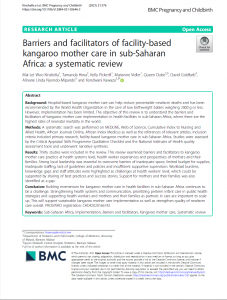
Background
Hospital-based kangaroo mother care can help reduce preventable newborn deaths and has been recommended by the World Health Organization in the care of low birthweight babies weighing 2000 g or less. However, implementation has been limited. The objective of this review is to understand the barriers and facilitators of kangaroo mother care implementation in health facilities in sub-Saharan Africa, where there are the highest rates of neonatal mortality in the world.
Methods
A systematic search was performed on MEDLINE, Web of Science, Cumulative Index to Nursing and Allied Health, African Journals Online, African Index Medicus as well as the references of relevant articles. Inclusion criteria included primary research, facility-based kangaroo mother care in sub-Saharan Africa. Studies were assessed by the Critical Appraisal Skills Programme Qualitative Checklist and the National Institutes of Health quality assessment tools and underwent narrative synthesis.
Results
Thirty studies were included in the review. This review examined barriers and facilitators to kangaroo mother care practice at health systems level, health worker experiences and perspectives of mothers and their families. Strong local leadership was essential to overcome barriers of inadequate space, limited budget for supplies, inadequate staffing, lack of guidelines and policies and insufficient supportive supervision. Workload burdens, knowledge gaps and staff attitudes were highlighted as challenges at health workers’ level, which could be supported by sharing of best practices and success stories. Support for mothers and their families was also identified as a gap.